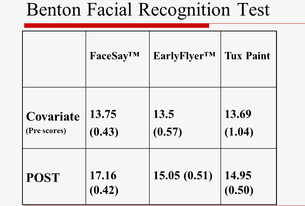FaceSay RCT with 87 Typically Developing Preschoolers

In this Randomized Controlled Study[1], led by Trista Perez for her Masters Thesis and Doctoral Dissertation at the University of Alabama, Birmingham, 87 typically developing HeadStart preschool students, ages 3-5 were recruited and randomly assigned to one of three treatments, a modified version of FaceSay, a high-frequency word spelling game I created called EarlyFlyer, and Tux Paint, a drawing program.
Because it was considered too challenging for preschoolers, we decided to omit the facial expression matching game, "Follow the Face". I created this modified version of FaceSay for this study containing only the "Amazing Gazing" game for Joint Attention and "Bandaid Clinic" for Face Recognition. There was no targeted content to teach emotion recognition.
Like FaceSay, EarlyFlyers used talking animal coaches that addressed the kids by name and the talking flower baby provided an introduction in a recorded voice. Instead of human main characters, EarlyFlyer's main character was Teddy, the talking dog. The setting for EarlyFlyer is an imaginary "fort", under the kitchen table. Although the target of EarlyFlyer is reading fluency through spelling high-frequency words, it contains some social elements. In addition to talking to the students, the animal coaches do make facial expressions and there is some non-verbal communication. When a student types an incorrect letter, the coach will open her mouth and eyes wide but not say anything. Once the child corrects the letter, the coach returns to a neutral expression. Tux Paint is a drawing program that has no social content.
Without any training on facial expressions, the emotion recognition measure was not significant, as I would expect The FaceSay participants did improve significantly more on the Benton Face Recognition test.
[1] Evaluating the efficacy of computer social skills game in improving the social-emotional development of head start children, ProQuest, UMI Dissertations Publishing, 2012, Dissertation # 3525981
Because it was considered too challenging for preschoolers, we decided to omit the facial expression matching game, "Follow the Face". I created this modified version of FaceSay for this study containing only the "Amazing Gazing" game for Joint Attention and "Bandaid Clinic" for Face Recognition. There was no targeted content to teach emotion recognition.
Like FaceSay, EarlyFlyers used talking animal coaches that addressed the kids by name and the talking flower baby provided an introduction in a recorded voice. Instead of human main characters, EarlyFlyer's main character was Teddy, the talking dog. The setting for EarlyFlyer is an imaginary "fort", under the kitchen table. Although the target of EarlyFlyer is reading fluency through spelling high-frequency words, it contains some social elements. In addition to talking to the students, the animal coaches do make facial expressions and there is some non-verbal communication. When a student types an incorrect letter, the coach will open her mouth and eyes wide but not say anything. Once the child corrects the letter, the coach returns to a neutral expression. Tux Paint is a drawing program that has no social content.
Without any training on facial expressions, the emotion recognition measure was not significant, as I would expect The FaceSay participants did improve significantly more on the Benton Face Recognition test.
[1] Evaluating the efficacy of computer social skills game in improving the social-emotional development of head start children, ProQuest, UMI Dissertations Publishing, 2012, Dissertation # 3525981
Design, Participants and Materials
|
Design
"The proposed study involves three analyses of covariance on facial recognition, emotion recognition, and Social Skills Ratings. The independent variable is game (Face Say, Early Flyers, and Tux Paint). The covariate is pretest scores on the facial recognition test, emotion recognition test, and social skills rating. Analyses will be performed using SPSS" |
Participants
"Eighty-seven children between the ages of 3 and 5 were recruited from two Head Start centers in the southeast. African-American children comprise the majority of this population, and the population includes primarily low-income families. Approval to recruit participants and conduct the proposed study was obtained from the University of Alabama at Birmingham Institutional Review Board." |
Materials
Face Say Computer Game "Face Say is a computer program that contains two different games designed to teach children specific social skills" Early Flyers Computer Game "The children will play a computer game modeled after the Symbionica Spell First program. It will be used as an avatar type computer game control in this study" Tux Paint Computer Game "The children in this group will play a computer painting game that allows them to select different colors, line types, shapes, and sounds to create pictures. The game has sound effects and many graphics but lacks the avatars of the other two games. Tux Paint will be a computerized control, accounting for computer time and interaction with research assistants in the absence of avatar-directed activity." |